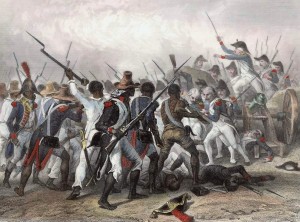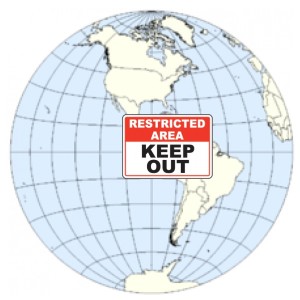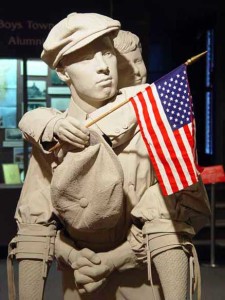One of the great Hip-Hop groups of the mid-to-late 1990’s was called “The Fugees”. In 1996, the group, consisting of Lauryn Hill, Pras Michel, and Wyclef Jean, released their album, “The Score”, which went on to sell approximately 15 Million copies worldwide, with 6 Million being sold in the United States alone, and ultimately won them two Grammy Awards in 1997. After their success as a group, they each released solo projects, with Hill selling over 12 Million copies worldwide (8 Million domestically) and Jean selling over 5 million copies worldwide (2 Million domestically). Wyclef Jean also went on to become a very sought after producer, making music for a veritable who’s-who in the music industry. So what does any of that have to do with the Louisiana Purchase and the ignored refugees? Calm down and hold on…I’ll get to that.
The trio’s name was originally “Tranzlator Crew”, but they later changed it to “The Fugees”, which was purposely taken from a word often used derogatorily to refer to Haitians in America…REFUGEES.
Arguably the hottest topic in the media today is the subject of the Syrian “Refugee Crisis”. Given what I know about history, I personally find it very interesting that so many folks on the Left seem hell bent on bringing any Syrian “Fugees” here to the United States. You see, Leftist/Regressive/Socialist minded Democrats never showed the same passion and concern about other “Fugees”, particularly those who are our hemispherical neighbors, as they have shown for “Fugees” who are half a world away. They surely were not trying to take in the 300-400,000 “Fugees” from Haiti back in June 1980 (under President Jimmy Carter), even though everyone knew that the dictator François “Papa Doc” Duvalier and his successor son, Jean Claude “Baby Doc” Duvalier, controlled brutally oppressive and wicked regimes. Many of those “Fugees” who were turned away by the Carter administration, either died at sea, or were eventually jailed and/or murdered by the Duvalier regimes upon their return to Haiti.
François “Papa Doc” Duvalier – President of Haiti from 1957 to 1971
Jean-Claude “Baby Doc” Duvalier – President of Haiti from 1971 to 1986
I seem to recall something in the Bible about “loving your neighbor”. More specifically, there is a scripture about “Bearing Others’ Burdens”, in Romans 15:1-2 (NKJV), where it says, “1 We then who are strong ought to bear with the scruples of the weak, and not to please ourselves. 2 Let each of us please his neighbor for his good, leading to edification.” Additionally, there is a great parable about the “Good Samaritan” in Luke 10:25-37 (NKJV) which teaches of showing mercy to those who are in need, and being a “good neighbor”. Well. from a geographic standpoint, Haiti is definitely our “neighbor”, being that it’s only 600 miles away from Florida. By comparison, the distance from Miami to Damascus, Syria is over 6,600 miles.
But here is something that you may, or may not be aware of…and this is where you finally get your question answered. Did you know that the United States wouldn’t even be what it is, had the slaves on the sugar plantations (they also harvested coffee, cocoa, indigo, and cotton) of Haiti not revolted against their French slave masters in 1791? You see, the events of the first French Revolution of 1789 caused a ripple effect that was felt worldwide. Prior to that bloody conflict, which reportedly saw as many as 2 million casualties, the États-Généraux (Estates-General), which was an advisory body to the King of France, issued a Declaration of the Rights of Man, similar to the Declaration of Independence created by the United States of America, which essentially declared all men “free and equal.” This conflict in France eventually found its way to their colonies in the Americas. Like a tsunami that gathers speed and strength while traveling unseen beneath the surface, it crashed on shore in Haiti with brutal force. On August, 1791, a leader of the Maroon slaves (and a high priest of voodou), Dutty Boukman, gave the signal to begin the revolt. Within ten days, the former slaves controlled the northern province, and by 1792, they controlled a third of the island of Hispaniola.
In 1793, France declared war on Great Britain, which consumed a lot of the resources of France, and they could no longer afford to have troops fighting the British in Europe, while simultaneously having a navy and troops trying to regain control of their Haitian colony. Eventually, because of all the social unrest in France, and the influence of the “Enlightenment”, the National Convention of the First Republic, lead by Maximilien de Robespierre, voted to abolish slavery in France, as well as in all it’s colonies. They ultimately granted civil and political rights to all Black men in the colonies.
Meanwhile the entire island of Hispaniola was becoming a battleground of European super-powers, because the British had invaded Haiti and were fighting the French, and the Spanish, who controlled the other half of the island, which became the Dominican Republic, also got in on the fight. Eventually Emperor Napoleon Bonaparte dispatched a large expeditionary force of French soldiers and warships to the island, and regained control of the island in the name of France. However, when it became apparent that, under Napoleon, France would once again institute slavery, another revolt took place in 1802.
With the revolt gaining strength, and the British maintaining a blockade of the port of Saint-Domingue, it simply was no longer cost effective for Napoleon to try to maintain control of the colony. Also, without control of that port city as their mid-point and gateway into North America, French ships could no long make the long journey from France, up into the Gulf of Mexico, and into the Louisiana Territory. So, Napoleon put out the “For Sale” sign.
Jumping at the once in a life time opportunity President Thomas Jefferson sent future President James Monroe to France to assist the Minister to the Court of Napoleon, Robert R. Livingston, in negotiating the Vente de la Louisiane (Sale of Louisiana) in 1803. Once completed, the acquisition of the Louisiana Territory would essentially double the United States of America, by adding 828,000 square miles to the fledgling nation. The treaty and sale was signed by LIvingston and Monroe on April 30, 1803, and reached President Jefferson in Washington on July 4th.
However, Napoleon was never one to go down without a fight, so he hadn’t completely given up yet on the idea of regaining control of his colony. The last battle of the Haitian Revolution, was the Battle of Vertières, which took place on November 18, 1803. The Haitian rebels, lead by Jean-Jacques Dessalines, defeated the French army of Napoleon. On January 1, 1804, the former French colony of Saint-Domingue was renamed “Haiti”, after the indigenous Arawak people, and declared an independent Nation. It also became only the second “Free Republic” in the entire western hemisphere…right behind the United States of America.
So, with all of that history now being exposed to you, it probably should become apparent to you that, without the efforts of our Haitian “neighbors” to the south, the United States, as we know it, doesn’t exist. Now does that mean that we were/are absolutely obligated to take in the “Fugees” from our hemispherical neighbor to the south? Absolutely not.
In the world of political science, particularly as it relates to foreign policy, there is a school of thought known as “practical politics”, or “Realpolitik”. In a nutshell, this philosophy is about a nation state taking a pragmatic view of the world, and unashamedly pursuing it’s own self-interest. With that in mind, I am not exactly mad at the Carter Administration for taking a “Realpolitik” view back in 1980, and deciding not to allow a mass influx of Hatian “Fugees”. Even to this day, you might be hard pressed to show exactly how the United States would ever benefit from taking in 300-400,000 “Fugees”, who were seemingly bringing no significant knowledge, skills, and abilities that would/could ultimately benefit this country.
However, I find it puzzling that the Left was so quick to turn a blind eye to the “Fugees” from Haiti, and was willing to allow them to either drown at sea, or die at the hands of a brutal dictator, but now all of a sudden they feel this moral obligation to take in 10,000 Syrian “Fugees”. Without a doubt, what is taking place in Syria is nothing short of a humanitarian crisis and a catastrophe. But, there are some significant difference between the Haitian “Fugees”, and the Syrian “Fugees”, especially as it relates to American Interests.
The “Monroe Doctrine”, advanced in 1823 by our 5th U.S. President, James Monroe, made it clear to the European powers, that the United States regarded the entire western hemisphere as it’s “sphere of influence”, and basically said, “KEEP OUT”.
We have held pretty strong to the Monroe Doctrine over these past two centuries, declaring that we had dominion over the western hemisphere. But the Biblical definition of “dominion” also implies…or requires that one exercise good stewardship. 1st Timothy, chapter 3 of the Bible talks about the “Qualifications of Overseers” or “Bishop”. In verses 4-5, it says that a Bishop/Overseer must be, 4 one who rules his own house well, having his children in submission with all reverence 5 (for if a man does not know how to rule his own house, how will he take care of the church of God?); My love for my country is only superseded by my love for my Lord and Savior, Jesus Christ, and my love for my family. However, loving your country doesn’t preclude you from being honest about the flaws and failings of your country. I would say that the U.S. as a “superpower”, allowing things to spiral out of control in Haiti to the point were hundreds of thousands were fleeing that failed nation state, was a failing in our stewardship of the hemisphere that we claim dominion over.
In a nation that was founded upon the three pillars of Greco-Roman Philosophy, Anglo-Saxon Law, and finally, Judea-Christian Morality, Realpolitik cannot always be the final factor for deciding how we are going to conduct our foreign policy. In fact, in my humble opinion, Realpolitik and the Monroe Doctrine are antithetical, and mutually exclusive. Not only would the United States not be a great nation in physical size were it not for the people of Haiti revolting for liberty, but we ultimately would never have been a great nation at all without the additional land acquired from the Vente de la Louisiane.
If we are going to do anything about Syria, we should do our best to provide humanitarian aid to them, and I think even that is best left to private organizations. We have no historical ties to the people of Syria. There is no significant cultural cohesion between the United States and the people of Syria. Their culture has no foundation that coincides with ours. We literally come from two different worlds. If the United States of America was ever morally obligated to take in any “Fugees”, it would have been the “Fugees” from our Haitian neighbors to the south. They are not only our neighbors, but they are our brothers in liberty. If you are going to claim dominion, then they ain’t heavy, they’re our brothers.







